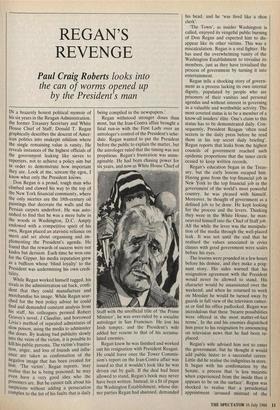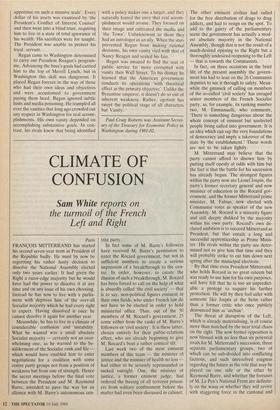REGAN'S REVENGE
Paul Craig Roberts looks into
the can of worms opened up by the President's man
IN a brazenly honest political memoir of his six years in the Reagan Administration, the former Treasury Secretary and White House Chief of Staff, Donald T. Regan graphically describes the descent of Amer- man politics into snakepit nihilism where the single remaining value is vanity. He reveals instances of the highest officials of the government leaking like sieves to reporters, not to achieve a policy aim but In order to demonstrate how important they are. Look at me, scream the egos, I know what only the President knOws.
Don Regan is a proud, tough man who climbed and clawed his way to the top of the New York financial community, where the only niceties are the 18th-century oil paintings that decorate the walls and the Persian carpets underfoot. He was asto- nished to find that he was a mere babe in the woods in Washington, D.C. Amply endowed with a competitive spirit of his own, Regan placed an atavistic reliance on merit and set about organising and im- plementing the President's agenda. He found that the rewards of success were not kudos but derision. Each time he won one for the Gipper, his media reputation grew as a buffoon whose 'blind loyalty' to the President was undermining his own credi- bility.
While Regan worked himself ragged, his rivals in the administration sat back, confi- dent that they could manufacture and merchandise his image. While Regan sear- ched for the best policy advice he could find and demanded constant analysis from his staff, his colleagues perused Robert Graves's novel, Claudius, and borrowed Livia's method of repeated admixtures of slow poison, using the media to administer the doses. By leaking bad publicity slowly Into the veins of the victim, it is possible to kill his public persona. The victim's frustra- tion, anger, and loss of friends and influ- ence are taken as confirmation of the negative image that has been created for 'The victim', Regan reports, 'may realise that he is being poisoned; he may even have a very good idea who the poisoners are. But he cannot talk about his suspicions without adding a persecution complex to the list of his faults that is daily being compiled in the newspapers.' Regan withstood stronger doses than most, but the Iran-Contra affair brought a fatal run-in with the First Lady over an astrologer's control of the President's sche- dule. Regan wanted to put the President before the public to explain the matter, but the astrologer ruled that the timing was not propitious. Regan's frustration was unim- aginable. He had been chasing power for six years, and now as White House Chief of Staff with the unofficial title of 'the Prime Minister', he was over-ruled by a socialite astrologer in San Francisco. He lost his Irish temper, and the President's wife added her venom to that of his accumu- lated enemies.
Regan knew he was finished and worked out his resignation with President Reagan. He could leave once the Tower Commis- sion's report on the Iran-Contra affair was issued so that it wouldn't look like he was driven out by guilt. If the deal had been allowed to stand, Regan's book may never have been written. Instead, in a fit of pique the Washington Establishment, whose din- ner parties Regan had shunned, demanded his head, and he 'was fired like a shoe clerk'.
'The Town', as insider Washington is called, enjoyed its vengeful public burning of Don Regan and expected him to dis- appear like its other victims. This was a miscalculation. Regan is a real fighter. He has used. the overwhelming vanity of the Washington Establishment to trivialise its members, just as they have trivialised the process of government by turning it into entertainment.
Regan tells a shocking story of govern- ment as a process lacking its own internal dignity, populated by people who are prisoners of their vanities and personal agendas and without interest in governing as a valuable and worthwhile activity. The most coveted status is to be a member of a know-all insiders' elite. One's claim to this status has to be demonstrated daily. Con- sequently, President Reagan 'often read secrets in the daily press before he read them in his top secret daily briefing'. Regan reports that leaks from the highest councils of government reached such epidemic proportions that the inner circle ceased to keep written records.
Regan's education began in the Treas- ury, but the early lessons escaped him.
Having gone from the top financial job in New York to the top financial job in the government of the world's most powerful country, he was pleased with himself.
Moreover, he thought of government as a defined job to be done. He kept looking for the process and the levers. Thinking they were in the White House, he man- oeuvred himself into the Chief of Staff job.
All the while the lever was the manipula- tion of the media through the well-placed leak. It was not until the end that he realised the values associated in civics classes with good government. were scales before his eyes.
The lessons were pounded in a few hours before his demise, and they make a poig- nant story. His aides warned that his resignation agreement with the President would never be allowed to stand. His character would be assassinated over the weekend, and when he returned to work on Monday he would be turned away by guards in full view of the television camer- as or find his office padlocked. Regan was incredulous that these 'bizarre possibilities were offered in the most matter-of-fact terms'. In the end his enemies dispatched him prior to his resignation by announcing on television news that he had been re- placed.
Regan's wife advised him not to enter the government, but he thought it would add public lustre to a successful career. Little did he realise the indignities in store.
It began with his confirmation by the Senate, a process that 'is less majestic when experienced from the inside than it appears to be on the surface'. Regan was shocked to realise that a presidential appointment 'aroused mistrust of the appointee on such a massive scale'. Every dollar of his assets was examined by `the President's Conflict of Interest Counsel' and then went into a blind trust, requiring him to live in a state of total ignorance of his wealth. His sacrifices were for naught. The President was unable to protect his loyal servant.
Regan came to Washington determined to carry out President Reagan's program- me. Advancing the boss's goals had carried him to the top of Merrill Lynch, but in Washington this skill was dangerous. It placed Regan forever in the way of those who had their own ideas and objectives and were accustomed to government paying them heed. Regan ignored subtle hints and media poisoning. He trampled all over the vanities that long ago crowded out any respect in Washington for real accom- plishments. His own vanity depended on accomplishing substantive goals. In con- trast, his rivals knew that being identified with a policy makes one a target, and they naturally feared the envy that real accom- plishment would arouse. They focused on their image and cultivated the media and `the Town'. Unbeknownst to them they had an astrologer as an ally. When the stars prevented Regan from making rational decisions, his own vanity vied with that of Nancy Reagan and sealed his fate.
Regan was amazed to find the seat of public service far more corrupted with vanity then Wall Street. To his dismay he learned that the American government conducts its operations 'with theatrical effect as the primary objective'. Unlike the Byzantine emperor, it doesn't do so out of inherent weakness. Rather, egotism has swept the political stage of all characters but Vanity.
Paul Craig Roberts was Assistant Secret- ary of the Treasury for Economic Policy in Washington during 1981-82.



















































 Previous page
Previous page